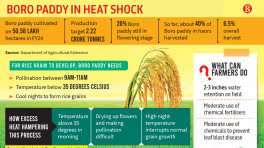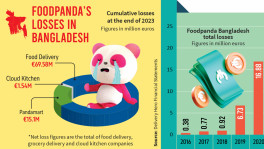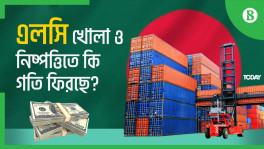25% of doctors and nurses don’t have PPEs: Brac survey
Caught up in uncertainty and anxiety, low-income and marginalised people, frontline health workers and apparel workers are under tremendous stress now

From frontline healthcare workers to low-income and marginalised people to apparel workers, Covid-19 is stretching everyone to the limit.
Low-income and marginalised people who do not have work now are under immense pressure during this challenging time.
Frontline healthcare workers fear that the disease might spread among their family members. Stress, anxiety, and insomnia are affecting their performance too.
And apparel workers, who do not have any income or work now, face the prospect of job loss.
As many as 25 percent of doctors and nurses and around 60 percent of support staff engaged in treating coronavirus patients are yet to receive personal protective equipment (PPE). And those who have the equipment are sceptical about its effectiveness, reveals a rapid telephone-based survey.
Brac University's James P Grant School of Public Health and the Bangladesh Health Watch unveiled the findings of the survey in an online media briefing on Saturday.
The six separate surveys, conducted from March to April, covered the impacts of coronavirus on frontline health workers, the general and mental health of the population at large, slum-dwellers, apparel workers, and marginalised groups, including the transgender community in Bangladesh.
The survey finds that almost all slum-dwellers do not have any work and income now. Also, transgender people are believed to be left out from the traditional relief support for their third gender status.
Apparel workers
The survey found that 47 percent of apparel workers think that they have lost their jobs amid the protracted shutdown over the coronavirus pandemic.
Another 24 percent of workers were on leave with full pay and 11 percent with partial pay.
A total of 159 people working in the apparel sector took part in the rapid survey during April
5-13. Of them, 51 percent were male and 49 percent female.
The survey also revealed that 35 percent of the workers got no support, 62 percent received some safety equipment including masks, and only 9 percent received some form of economic support including bonus.
Frontline healthcare workers
"Seventy-five percent of frontline doctors and nurses and 40 percent support staff have received PPEs. However, they are sceptical about the quality of the raincoat-like PPEs," said Bushra Zerin Islam, a researcher involved in the survey.
"The World Health Organisation (WHO) recommends that PPEs should be used once and then destroyed. But our healthcare workers are being told to reuse their equipment. This is causing them great stress and anxiety."
The survey found that the doctors had undertaken the initiative to study the WHO guidelines on wearing, using and managing PPEs, but most nurses were not given any training on its use.
Researchers said 60 doctors and nurses from 43 hospitals and health centres in 14 districts participated in the survey, conducted during April 9-14, over the telephone.
Slum-dwellers and transgender communities
Two separate surveys of transgender (hijra) people living in slums found that they are living in fear and panic.
"The transgender community has been speculating that they will not receive any treatment and will die of the disease. Their income is also taking a hit. Since they move around in groups, they are being thought of as carriers of the virus. They are becoming even more marginalised now," said Bachera Aktar, a researcher.
Of the 51 residents of six selected slums of Dhaka who were interviewed via telephone from March 30 to April 12, Forty seven respondents said they are out of work now and do not have any money.
Also, they said the relief distribution effort is imbalanced and unfair as most of them allegedly did not receive any food aid. These people are also suffering from emotional and mental stress due to increased uncertainty in their lives: restlessness, sleeplessness, and worries all the time.
The researchers recommend that the public health sector and policy-makers consider these highly vulnerable groups while designing and implementing programmatic support for the Covid-19 crisis and post-outbreak efforts.
Mental health and awareness
The researchers also analysed the mental health and Covid-19 awareness from the nationally representative samples of 1,309 respondents.
A total of 58 percent of respondents said they are in stress over the thought that their income might stop. And 38 percent said they are consuming less. And 45 percent said they are sharing essential resources with other households.
And there is a serious lack of awareness about the disease. The survey found that a lot of people still do not know how the disease spreads. More than one in five rural women are unaware of how Covid-19 spreads.


 Keep updated, follow The Business Standard's Google news channel
Keep updated, follow The Business Standard's Google news channel
















